Unit 2 Why don’t you talk to your parents? Section B Period 2 (2a-Self Check) 课件
文档属性
| 名称 | Unit 2 Why don’t you talk to your parents? Section B Period 2 (2a-Self Check) 课件 |
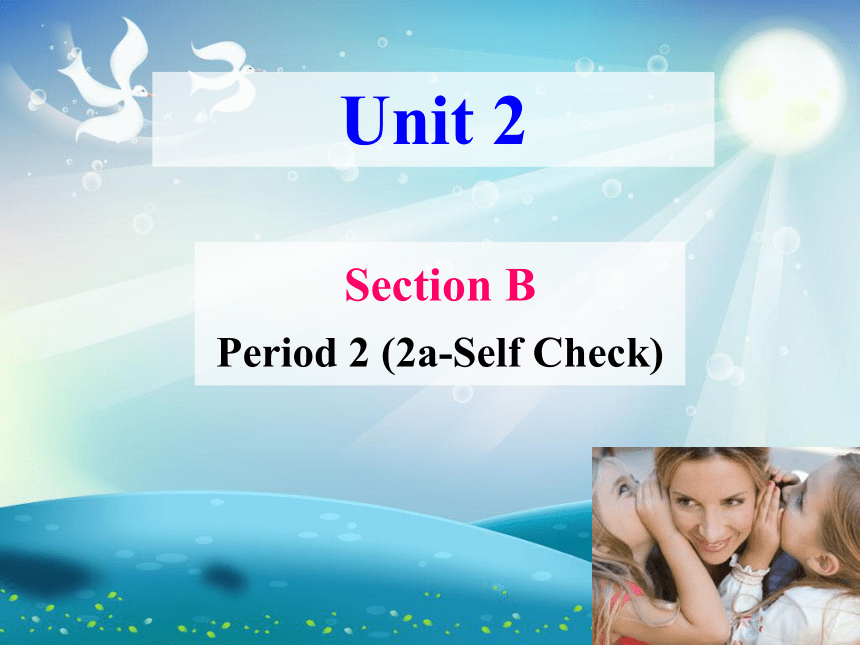
|
|
| 格式 | zip | ||
| 文件大小 | 728.0KB | ||
| 资源类型 | 教案 | ||
| 版本资源 | 鲁教版 | ||
| 科目 | 英语 | ||
| 更新时间 | 2017-12-27 00:00:00 | ||
图片预览

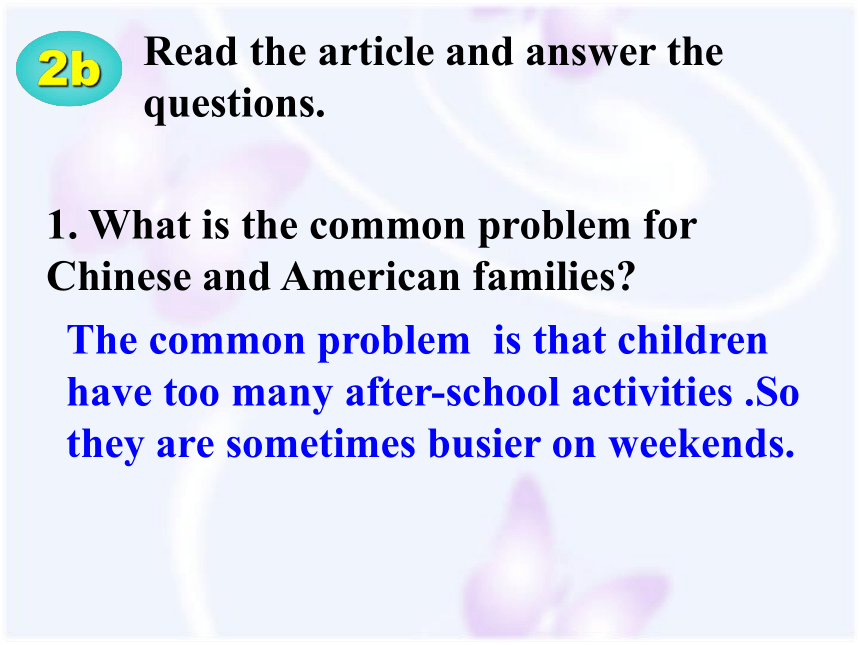

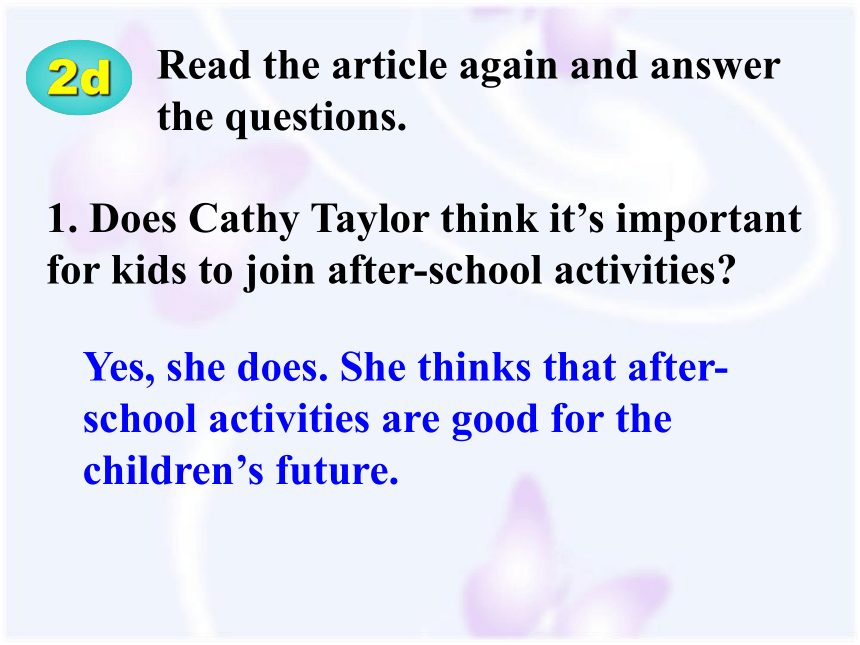
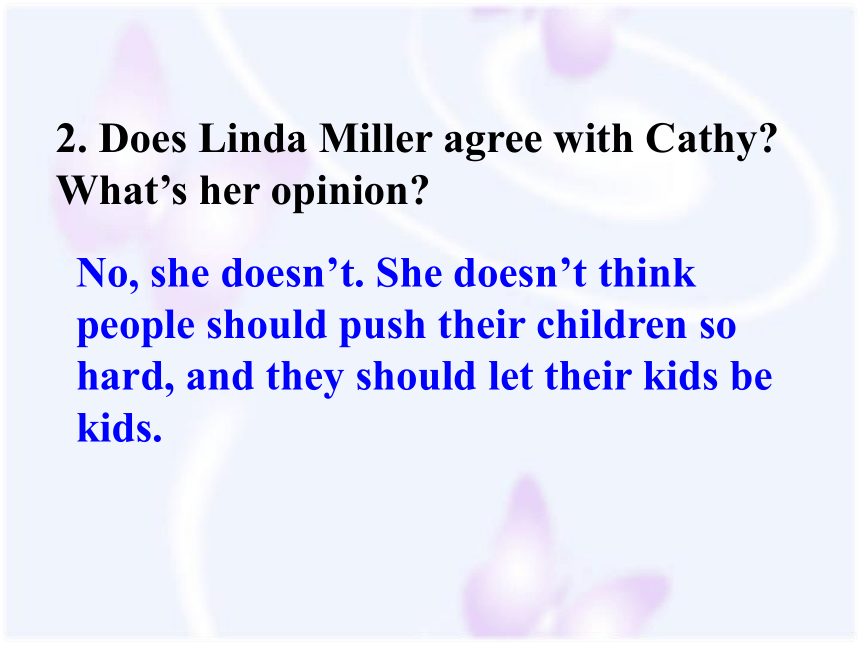
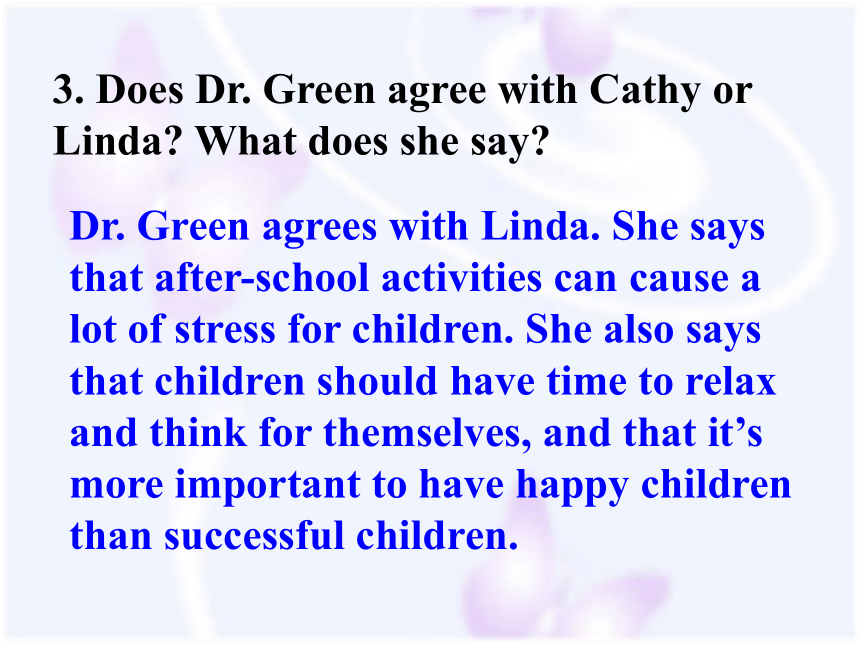
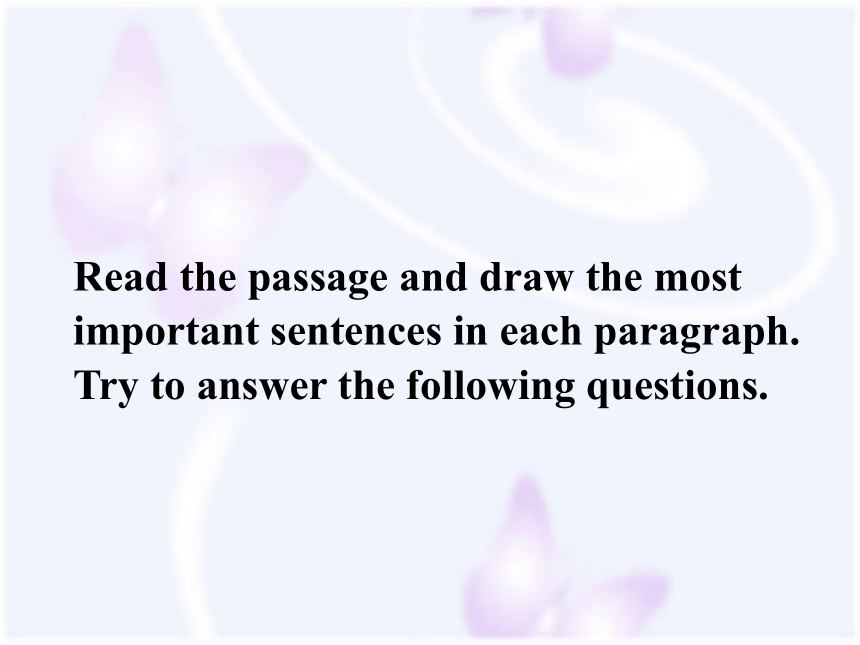
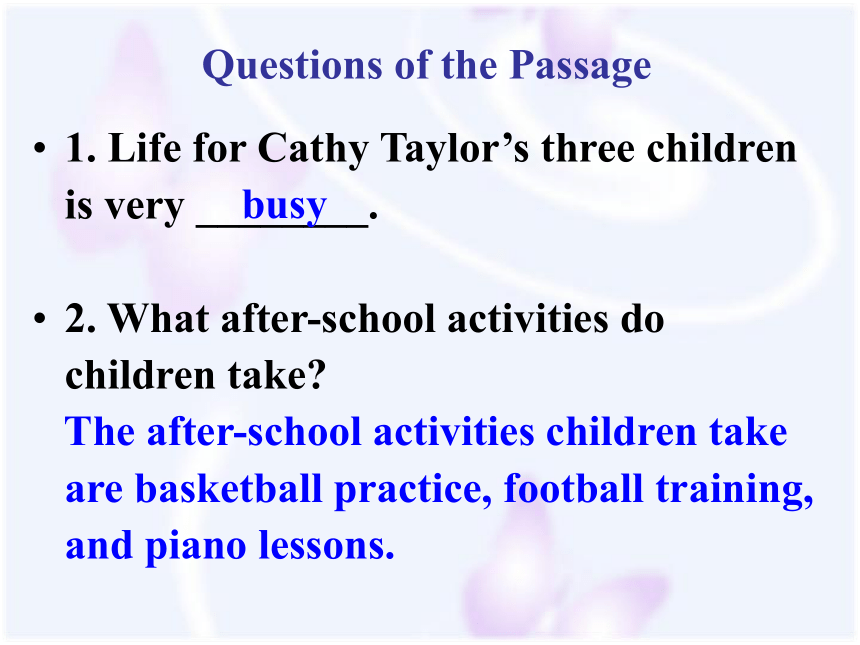
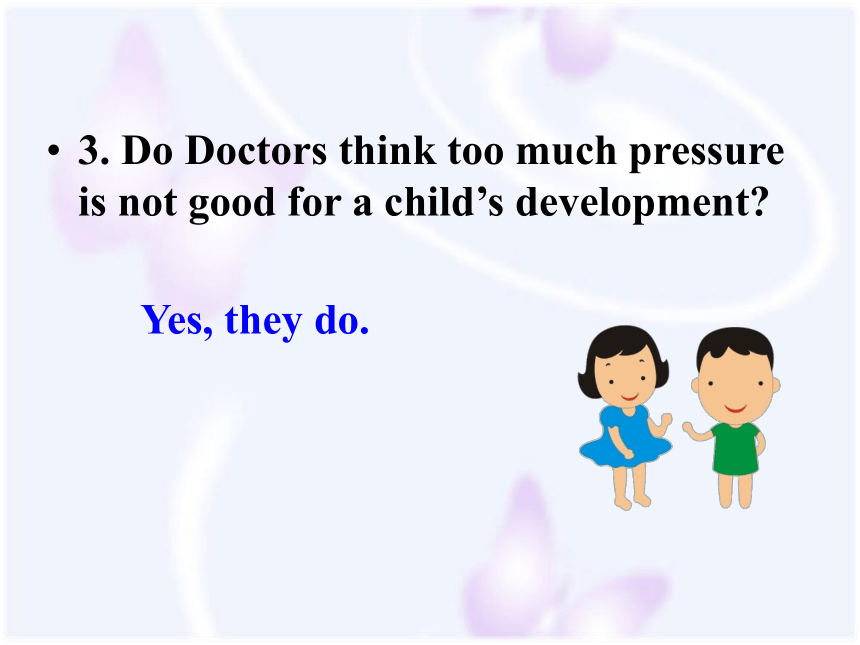
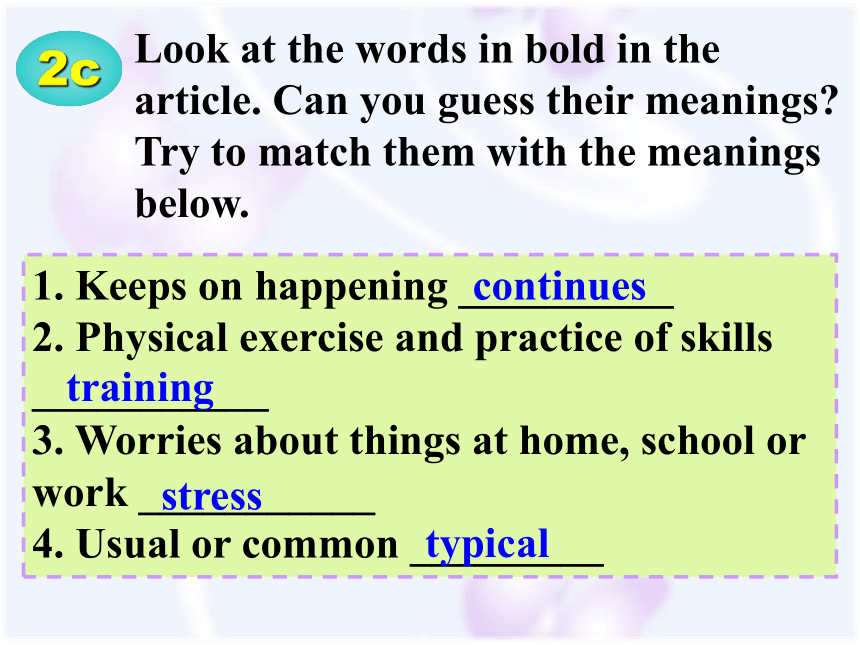
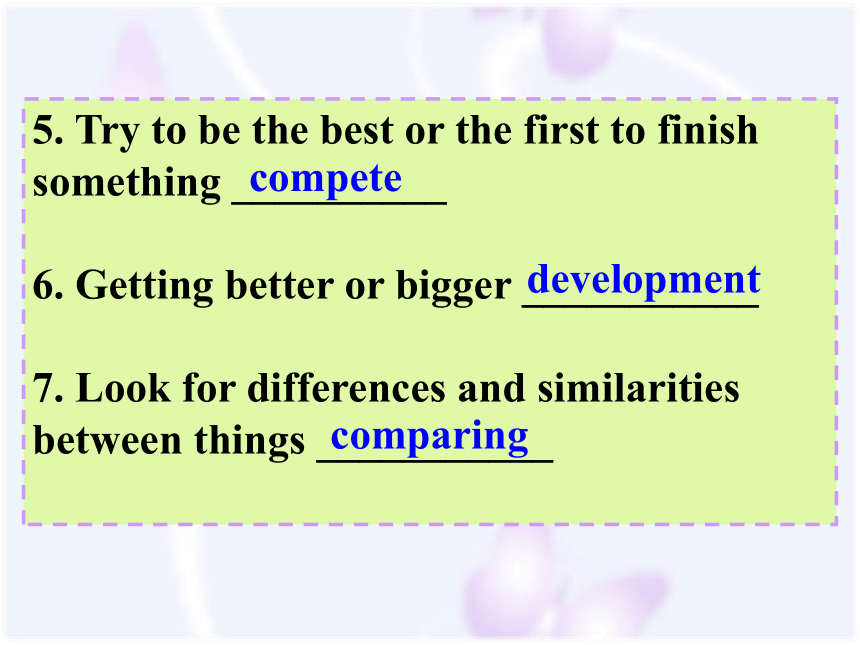
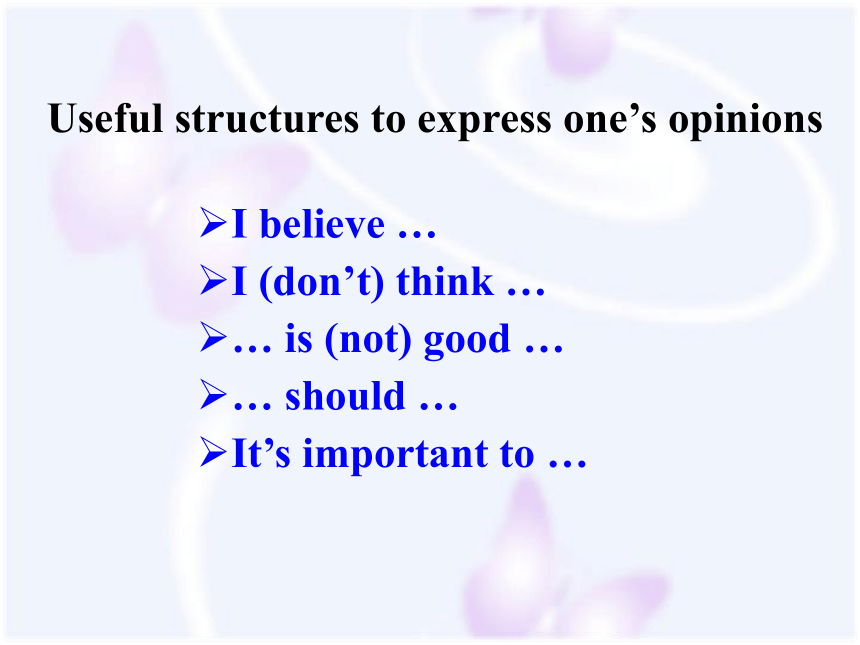
文档简介
课件59张PPT。Unit 2Section B
Period 2 (2a-Self Check)Read the article and answer the questions.2b1. What is the common problem for Chinese and American families?The common problem is that children have too many after-school activities .So they are sometimes busier on weekends.2. Who gives their opinions about the problem?Cathy Taylor (a mother with three children), Linda Miller (a mother with three children), and Dr. Alice Green (a doctor) give their opinions about the problem.2dRead the article again and answer the questions.Yes, she does. She thinks that after-school activities are good for the children’s future.1. Does Cathy Taylor think it’s important for kids to join after-school activities?2. Does Linda Miller agree with Cathy? What’s her opinion?No, she doesn’t. She doesn’t think people should push their children so hard, and they should let their kids be kids.3. Does Dr. Green agree with Cathy or Linda? What does she say?Dr. Green agrees with Linda. She says that after-school activities can cause a lot of stress for children. She also says that children should have time to relax and think for themselves, and that it’s more important to have happy children than successful children.Read the passage and draw the most important sentences in each paragraph. Try to answer the following questions.Questions of the Passage1. Life for Cathy Taylor’s three children is very ________.
2. What after-school activities do children take?
The after-school activities children take are basketball practice, football training, and piano lessons.busy3. Do Doctors think too much pressure is not good for a child’s development?Yes, they do.2cLook at the words in bold in the article. Can you guess their meanings? Try to match them with the meanings below.1. Keeps on happening __________
2. Physical exercise and practice of skills ___________
3. Worries about things at home, school or work ___________
4. Usual or common _________continuestrainingstresstypical5. Try to be the best or the first to finish something __________
6. Getting better or bigger ___________
7. Look for differences and similarities between things ___________
competedevelopmentcomparingI believe …
I (don’t) think …
… is (not) good …
… should …
It’s important to …Useful structures to express one’s opinionsDiscuss the questions with your partner.1. What do you think of after-school activities?
2eIn my opinion, if the kids really like the activity such as basketball, he can go to these classes. They may have some fun as well some skills. I don’t agree that some parents push the kids to take these activities.2. What should you do to relax?There are a lot of ways to relax. I’d like to listen to music or play sports to relax. But my best friend would like to sleep a lot and eat some nice food.3aRead the opinions below and make notes on your own opinions.Why should children take after-school classes?
“After-school classes can help kids get into a good university.”
2. “I want my child to be a successful person.”
3. “It’s good for children to start learning from a young age.”Your opinions
Agree: After-school classes are good for the children’s future. They can help children get into good schools and universities.
Some of these classes help children get better grades at school. Better grades help children feel good about themselves. Some classes help children learn important skills not taught at school. These skills may actually help children relax, e.g. playing a sport or playing a musical instrument.
People learn better at a younger age.
Children have more time than adults, so they should learn as much as they can before they get too busy to learn new things.Your opinions
Disagree: After-school classes take away the children’s free time. Children have no time to relax and just do nothing.
Children may be so busy they have no time to absorb and apply what they have been taught.
Some children are made to learn skills they are not interested in. These classes cause the children to be stressed.
These classes take away the children’s childhood.3bWrite a letter to the magazine to express your opinions on after-school classes for children. Use the following expressions to help you.Dear Sir or Madam,
I don’t really agree with what parents are saying about after-school classes because they only seem to think that getting their children into good schools or having successful children.
Although some parents are right about the importance of learning at a young age, I think children should be allowed to be children and have a carefree childhood. In my opinion, it is important for parents not to push their children too hard. I believe it is better if parents try to really understand their children’s interests and abilities first so that they will not make their children take classes that are not suitable for them.
Perhaps parents could let their children decide for themselves if they want to have any after-school classes. If children are allowed to take the classes they choose for themselves, they will benefit more from these classes. They will grow up to be not only successful in their own way but happy too.
Yours truly,
WeisongSelf Check1Fill in the blanks using until, so that or although.You should eat more now ________
you won’t be hungry later.
2. ________ you may not like to do chores, you should help your parents around the house.so that Although 3. You should save more money ________
you can buy a gift for your friend’s
birthday.
4. Kids shouldn’t play computer games
___________ late at night. They should
rest early.
5. ___________ many people like to eat
junk food, they should really eat more
fruit and vegetables _________ they can
be healthy.so that until so that Although 2For each problem, choose the advice you agree with more. Then write your own advice.1. My best friend and I had a fight, and now she won’t speak to me.
A: You should keep trying to talk to her until she talks to you.
B: Why don’t you wait a few more days before talking to her?
My advice: __________________________You should look for a chance to say sorry to her. 2. My friend wants me to go to a party on the weekend, but I want to study for my exams next week.
A: Why don’t you just go to the party? It’ll help you to relax.
B: You should study for the exams because they’re more important than a party.
My advice: __________________________
____________________________________
____________________________________
Why don’t you try to study as much as you can these few days before you decide whether or not go to the party this weekend? 3. My brother watches television while I’m trying to study.
A: Why don’t you tell him to do something quiet when you’re studying?
B: You could tell him to turn down the TV.
My advice: __________________________
____________________________________
____________________________________ Perhaps you could study somewhere in your house where you can’t hear the TV. Are after–school classes good for children?DiscussionSuppose you are a father / mother / teacher / doctor / an elementary school child / a senior high school student / …, what’s your opinion?New Wordsopinion n.
skill n.
typical adj.
football n.
cut out
quick adj.
continue v.
compare v. 意见;想法;看法
技艺;技巧
典型的
(美式)橄榄球;足球
删除;删去
快的;迅速的;时间短暂的
持续;继续存在
比较compare …with …
crazy adj.
push v.
development n.
cause v.
usual adj.
in one’s opinion
perhaps adv. 比较;对比
不理智的;疯狂的
鞭策;督促;推动;
发展;发育;成长
造成;引起
通常的;寻常的
依…看
可能;大概;也许Language points1. Who gives their opinions about the problem? opinion n. 意见;想法;看法
I can't agree with your opinion in this respect.
在这方面,我不赞同你的意见。
I don't care about your opinion.
你的意见我不在乎。 in one’s opinion = in the opinion of
依照(某人的)看法, 在(某人)看来
In my opinion he is not right.
据我看来,他是错的。
In the opinion of mine, what he said is not true at all.
依我看来,他说的一点也不真实。
give opinions about sth. 给出关于某事的观点The food safety is a serious _______ in our country. We should try to solve it.
A. subject B. program
C. problem D. opinion
【解析】由句意“食品安全问题在我们国家是个很严重的问题”可知答 案选 C 项,意为“问题”;而 A项“科目”、B 项“节目”、D 项“观点”均不合题意,故排除。C“the + 姓+ s ”表示“夫妇 或 一家人”
the Greens 格林夫妇;格林一家
The Smiths is a happy family.
The Smiths are vey kind to that little girl.
谓语动词要看具体情况,如果是指整个一家人谓语就用单数,如果指一家人中的每个人则用复数。2. The Taylors are a typical American family.___________ were having supper when I got there.
我到那儿时特纳一家正在吃晚饭。The Turners 3. Maybe I could cut out a few of their activities … cut out 删除;删去
I cut out the paragraph in this article.
我删除了这篇文章的一个段落。
You'd better cut out that sentence.
你最好把那个句子删掉。 cut out 剪下;剪裁;戒掉;停止
She cut out the photograph from the paper.
她从报纸上把照片剪了下来。
He has decided to cut out smoking and drinking.
他已经决定戒掉烟酒。cut up 切碎
cut down 砍到
cut in 插队;插话
cut off 切断(水、电)供应 链 接?Don’t?_______?when?others?talk;
?it’s?impolite.?
A.?cut?out? B.?cut?in?
C.?cut?down? D.?cut?off?4. I?really?want?them?to?be?successful.?? successful? adj. 成功的
He aims to be a successful writer.
他的目标是成为一个成功的作家。
They are highly successful in business.
他们经商非常成功。? 拓 展succeed ?v. 成功,达到
succeed?in?doing sth.?
success? n. 成功
successfully adv. 成功地If at first you don’t ________(success), try again.
She works very hard, so she will ______ in ______ the exam.
successful; pass B. success, passing
C. succeed; passing D. successful, passing ?succeed C【2013甘肃兰州】Details?decide?______?(成功)?or?not.?If?we?take?everything?seriously,?
we’ll?achieve?our?goals.
?
【2013贵州铜仁】— What’s?the?secret?of
?your ________ (success)?
?— Work?hard.? successsuccess4. … don’t get home until after 7:00 p.m. until prep. 到……为止
I did my homework until my mother came back from work.
我一直做作业直到妈妈下班回家。
until 用于肯定句中,与延续性动词连用,表示动作或状态的持续。 I will wait for him ______ he ______ back.
A. until; will come B. until; comes
C. after; will come D. after; comes
【点拨】选B。句意为:我将等到他回来。
not ... until ... “直到…才;不到…不”,常与非延续性动词连用,当主句用一般将来时,until引导的从句用一般现在时表将来。5. They have a quick dinner, and it’s time for homework. It’s time for sth. 是到做某事的时候了。
It’s time for lunch. 午餐时间到了。
It’s time to do sth.
It’s time to go to school. 上学的时间到了。
It’s 9:30 pm, children! _____ is time to
go to bed.
A. That B. It C. This D. They(2014北京中考)
把东西收好,该睡觉了。
Put your things away. _______________ bed.
开会的时间了。 It’s time for It’s time to have meeting. 6. … continues until the kids get older. continue v. 继续;持续
The rain continued all day.
雨连续下了一整天。
He continued to write / writing while in hospital.
他住院时他继续写作。
He?continued?working when he was ill. ??
他在生病期间一直坚持工作。如果继续砍伐树木,动物将无处可住。(continue )If we continue to cut down trees, animals will have nowhere to live / have no place to live in.7. Mothers send their small kids to all kinds of classes. send v. 派遣、打发、安排去
He sent his son to return the books to the library.
他派他儿子把书还给图书馆。
I'll send someone to show you around.
我派人带你到周围转转。send away 赶走
send for 派人去请
send off 寄出
send out 分发
send up 发射
send sb. sth. = send sth. to sb. 送给某人某物
【注】类似的动词有:
show (展示; 给…看) give (给)
lend (借出) offer (提供)
return (归还) tell (告诉)send, give这两个词均可表示“送, 交给”,其区别是:
give一般指亲手给, 而send则指寄送或派人送。试比较:
He gave me some pictures of Guilin.
他给了我几张桂林的照片。
He sent me some pictures of Guilin.
他寄给我几张桂林的照片。8. … comparing them with other children. compare v. 比较
And they are always comparing them with other children.
并且他们总是拿他们和其他孩子作比较。 People often compare the life ______ a stage (舞台).
A. with B. to C. of D. about 【点拨】选B。compare ... to ... “把…比作”,不同事物相比。compare ... with ... “与…相比较”,相同事物相比。句意为:人们经常把人生比作一个舞台。故选B。9. People shouldn’t push their kids so hard. push v. 推动;移动
The little boy?pushed?the door open.
小男孩把门推开了。 push ahead (on, forward)
继续前进,坚持下去
push through
排除困难办好谋事,努力设法通过,挤过10. … says all these activities can cause a lot of stress for children. cause? v.?造成,使发生
This car has caused me a lot of trouble.
这辆车给我带来不少麻烦。
I'm afraid I am causing you much trouble.
我担心我给你增添麻烦。 cause?sb.?to?do?sth.?使某人做某事
The lightning caused the baby to cry.
闪电把孩子吓哭了。
cause?sb.?for?sb.?给某人添麻烦
She is always causing trouble for people.
她总是给人添麻烦。--- What can we do to ______ bird flu from spreading?
--- Try not to buy or eat chickens that have not been checked
A. prevent B. cause C. discoverA
Period 2 (2a-Self Check)Read the article and answer the questions.2b1. What is the common problem for Chinese and American families?The common problem is that children have too many after-school activities .So they are sometimes busier on weekends.2. Who gives their opinions about the problem?Cathy Taylor (a mother with three children), Linda Miller (a mother with three children), and Dr. Alice Green (a doctor) give their opinions about the problem.2dRead the article again and answer the questions.Yes, she does. She thinks that after-school activities are good for the children’s future.1. Does Cathy Taylor think it’s important for kids to join after-school activities?2. Does Linda Miller agree with Cathy? What’s her opinion?No, she doesn’t. She doesn’t think people should push their children so hard, and they should let their kids be kids.3. Does Dr. Green agree with Cathy or Linda? What does she say?Dr. Green agrees with Linda. She says that after-school activities can cause a lot of stress for children. She also says that children should have time to relax and think for themselves, and that it’s more important to have happy children than successful children.Read the passage and draw the most important sentences in each paragraph. Try to answer the following questions.Questions of the Passage1. Life for Cathy Taylor’s three children is very ________.
2. What after-school activities do children take?
The after-school activities children take are basketball practice, football training, and piano lessons.busy3. Do Doctors think too much pressure is not good for a child’s development?Yes, they do.2cLook at the words in bold in the article. Can you guess their meanings? Try to match them with the meanings below.1. Keeps on happening __________
2. Physical exercise and practice of skills ___________
3. Worries about things at home, school or work ___________
4. Usual or common _________continuestrainingstresstypical5. Try to be the best or the first to finish something __________
6. Getting better or bigger ___________
7. Look for differences and similarities between things ___________
competedevelopmentcomparingI believe …
I (don’t) think …
… is (not) good …
… should …
It’s important to …Useful structures to express one’s opinionsDiscuss the questions with your partner.1. What do you think of after-school activities?
2eIn my opinion, if the kids really like the activity such as basketball, he can go to these classes. They may have some fun as well some skills. I don’t agree that some parents push the kids to take these activities.2. What should you do to relax?There are a lot of ways to relax. I’d like to listen to music or play sports to relax. But my best friend would like to sleep a lot and eat some nice food.3aRead the opinions below and make notes on your own opinions.Why should children take after-school classes?
“After-school classes can help kids get into a good university.”
2. “I want my child to be a successful person.”
3. “It’s good for children to start learning from a young age.”Your opinions
Agree: After-school classes are good for the children’s future. They can help children get into good schools and universities.
Some of these classes help children get better grades at school. Better grades help children feel good about themselves. Some classes help children learn important skills not taught at school. These skills may actually help children relax, e.g. playing a sport or playing a musical instrument.
People learn better at a younger age.
Children have more time than adults, so they should learn as much as they can before they get too busy to learn new things.Your opinions
Disagree: After-school classes take away the children’s free time. Children have no time to relax and just do nothing.
Children may be so busy they have no time to absorb and apply what they have been taught.
Some children are made to learn skills they are not interested in. These classes cause the children to be stressed.
These classes take away the children’s childhood.3bWrite a letter to the magazine to express your opinions on after-school classes for children. Use the following expressions to help you.Dear Sir or Madam,
I don’t really agree with what parents are saying about after-school classes because they only seem to think that getting their children into good schools or having successful children.
Although some parents are right about the importance of learning at a young age, I think children should be allowed to be children and have a carefree childhood. In my opinion, it is important for parents not to push their children too hard. I believe it is better if parents try to really understand their children’s interests and abilities first so that they will not make their children take classes that are not suitable for them.
Perhaps parents could let their children decide for themselves if they want to have any after-school classes. If children are allowed to take the classes they choose for themselves, they will benefit more from these classes. They will grow up to be not only successful in their own way but happy too.
Yours truly,
WeisongSelf Check1Fill in the blanks using until, so that or although.You should eat more now ________
you won’t be hungry later.
2. ________ you may not like to do chores, you should help your parents around the house.so that Although 3. You should save more money ________
you can buy a gift for your friend’s
birthday.
4. Kids shouldn’t play computer games
___________ late at night. They should
rest early.
5. ___________ many people like to eat
junk food, they should really eat more
fruit and vegetables _________ they can
be healthy.so that until so that Although 2For each problem, choose the advice you agree with more. Then write your own advice.1. My best friend and I had a fight, and now she won’t speak to me.
A: You should keep trying to talk to her until she talks to you.
B: Why don’t you wait a few more days before talking to her?
My advice: __________________________You should look for a chance to say sorry to her. 2. My friend wants me to go to a party on the weekend, but I want to study for my exams next week.
A: Why don’t you just go to the party? It’ll help you to relax.
B: You should study for the exams because they’re more important than a party.
My advice: __________________________
____________________________________
____________________________________
Why don’t you try to study as much as you can these few days before you decide whether or not go to the party this weekend? 3. My brother watches television while I’m trying to study.
A: Why don’t you tell him to do something quiet when you’re studying?
B: You could tell him to turn down the TV.
My advice: __________________________
____________________________________
____________________________________ Perhaps you could study somewhere in your house where you can’t hear the TV. Are after–school classes good for children?DiscussionSuppose you are a father / mother / teacher / doctor / an elementary school child / a senior high school student / …, what’s your opinion?New Wordsopinion n.
skill n.
typical adj.
football n.
cut out
quick adj.
continue v.
compare v. 意见;想法;看法
技艺;技巧
典型的
(美式)橄榄球;足球
删除;删去
快的;迅速的;时间短暂的
持续;继续存在
比较compare …with …
crazy adj.
push v.
development n.
cause v.
usual adj.
in one’s opinion
perhaps adv. 比较;对比
不理智的;疯狂的
鞭策;督促;推动;
发展;发育;成长
造成;引起
通常的;寻常的
依…看
可能;大概;也许Language points1. Who gives their opinions about the problem? opinion n. 意见;想法;看法
I can't agree with your opinion in this respect.
在这方面,我不赞同你的意见。
I don't care about your opinion.
你的意见我不在乎。 in one’s opinion = in the opinion of
依照(某人的)看法, 在(某人)看来
In my opinion he is not right.
据我看来,他是错的。
In the opinion of mine, what he said is not true at all.
依我看来,他说的一点也不真实。
give opinions about sth. 给出关于某事的观点The food safety is a serious _______ in our country. We should try to solve it.
A. subject B. program
C. problem D. opinion
【解析】由句意“食品安全问题在我们国家是个很严重的问题”可知答 案选 C 项,意为“问题”;而 A项“科目”、B 项“节目”、D 项“观点”均不合题意,故排除。C“the + 姓+ s ”表示“夫妇 或 一家人”
the Greens 格林夫妇;格林一家
The Smiths is a happy family.
The Smiths are vey kind to that little girl.
谓语动词要看具体情况,如果是指整个一家人谓语就用单数,如果指一家人中的每个人则用复数。2. The Taylors are a typical American family.___________ were having supper when I got there.
我到那儿时特纳一家正在吃晚饭。The Turners 3. Maybe I could cut out a few of their activities … cut out 删除;删去
I cut out the paragraph in this article.
我删除了这篇文章的一个段落。
You'd better cut out that sentence.
你最好把那个句子删掉。 cut out 剪下;剪裁;戒掉;停止
She cut out the photograph from the paper.
她从报纸上把照片剪了下来。
He has decided to cut out smoking and drinking.
他已经决定戒掉烟酒。cut up 切碎
cut down 砍到
cut in 插队;插话
cut off 切断(水、电)供应 链 接?Don’t?_______?when?others?talk;
?it’s?impolite.?
A.?cut?out? B.?cut?in?
C.?cut?down? D.?cut?off?4. I?really?want?them?to?be?successful.?? successful? adj. 成功的
He aims to be a successful writer.
他的目标是成为一个成功的作家。
They are highly successful in business.
他们经商非常成功。? 拓 展succeed ?v. 成功,达到
succeed?in?doing sth.?
success? n. 成功
successfully adv. 成功地If at first you don’t ________(success), try again.
She works very hard, so she will ______ in ______ the exam.
successful; pass B. success, passing
C. succeed; passing D. successful, passing ?succeed C【2013甘肃兰州】Details?decide?______?(成功)?or?not.?If?we?take?everything?seriously,?
we’ll?achieve?our?goals.
?
【2013贵州铜仁】— What’s?the?secret?of
?your ________ (success)?
?— Work?hard.? successsuccess4. … don’t get home until after 7:00 p.m. until prep. 到……为止
I did my homework until my mother came back from work.
我一直做作业直到妈妈下班回家。
until 用于肯定句中,与延续性动词连用,表示动作或状态的持续。 I will wait for him ______ he ______ back.
A. until; will come B. until; comes
C. after; will come D. after; comes
【点拨】选B。句意为:我将等到他回来。
not ... until ... “直到…才;不到…不”,常与非延续性动词连用,当主句用一般将来时,until引导的从句用一般现在时表将来。5. They have a quick dinner, and it’s time for homework. It’s time for sth. 是到做某事的时候了。
It’s time for lunch. 午餐时间到了。
It’s time to do sth.
It’s time to go to school. 上学的时间到了。
It’s 9:30 pm, children! _____ is time to
go to bed.
A. That B. It C. This D. They(2014北京中考)
把东西收好,该睡觉了。
Put your things away. _______________ bed.
开会的时间了。 It’s time for It’s time to have meeting. 6. … continues until the kids get older. continue v. 继续;持续
The rain continued all day.
雨连续下了一整天。
He continued to write / writing while in hospital.
他住院时他继续写作。
He?continued?working when he was ill. ??
他在生病期间一直坚持工作。如果继续砍伐树木,动物将无处可住。(continue )If we continue to cut down trees, animals will have nowhere to live / have no place to live in.7. Mothers send their small kids to all kinds of classes. send v. 派遣、打发、安排去
He sent his son to return the books to the library.
他派他儿子把书还给图书馆。
I'll send someone to show you around.
我派人带你到周围转转。send away 赶走
send for 派人去请
send off 寄出
send out 分发
send up 发射
send sb. sth. = send sth. to sb. 送给某人某物
【注】类似的动词有:
show (展示; 给…看) give (给)
lend (借出) offer (提供)
return (归还) tell (告诉)send, give这两个词均可表示“送, 交给”,其区别是:
give一般指亲手给, 而send则指寄送或派人送。试比较:
He gave me some pictures of Guilin.
他给了我几张桂林的照片。
He sent me some pictures of Guilin.
他寄给我几张桂林的照片。8. … comparing them with other children. compare v. 比较
And they are always comparing them with other children.
并且他们总是拿他们和其他孩子作比较。 People often compare the life ______ a stage (舞台).
A. with B. to C. of D. about 【点拨】选B。compare ... to ... “把…比作”,不同事物相比。compare ... with ... “与…相比较”,相同事物相比。句意为:人们经常把人生比作一个舞台。故选B。9. People shouldn’t push their kids so hard. push v. 推动;移动
The little boy?pushed?the door open.
小男孩把门推开了。 push ahead (on, forward)
继续前进,坚持下去
push through
排除困难办好谋事,努力设法通过,挤过10. … says all these activities can cause a lot of stress for children. cause? v.?造成,使发生
This car has caused me a lot of trouble.
这辆车给我带来不少麻烦。
I'm afraid I am causing you much trouble.
我担心我给你增添麻烦。 cause?sb.?to?do?sth.?使某人做某事
The lightning caused the baby to cry.
闪电把孩子吓哭了。
cause?sb.?for?sb.?给某人添麻烦
She is always causing trouble for people.
她总是给人添麻烦。--- What can we do to ______ bird flu from spreading?
--- Try not to buy or eat chickens that have not been checked
A. prevent B. cause C. discoverA
同课章节目录
- Unit 1 Could you please clean your room?
- Section A
- Section B
- Unit 2 Why don't you talk to your parents?
- Section A
- Section B
- Unit 3 What were you doing when the rainstorm came
- Section A
- Section B
- Unit 4 An old man tried to move the mountains.
- Section A
- Section B
- Unit 5 What's the highest mountain in the world?
- Section A
- Section B
- Unit 6 Have you read Treasure Island yet?
- Section A
- Section B
- Unit 7 Have you ever been to a museum?
- Section A
- Section B
- Unit 8 I've had this bike for three years.
- Section A
- Section B
